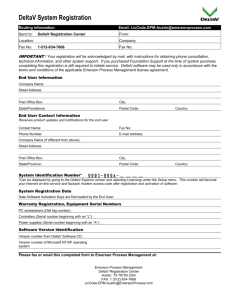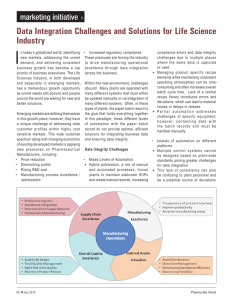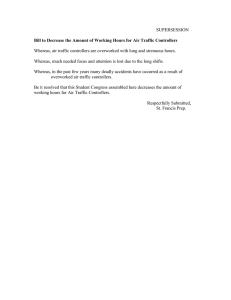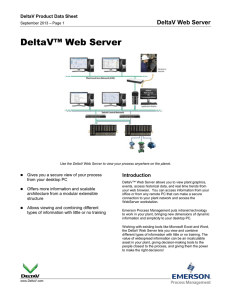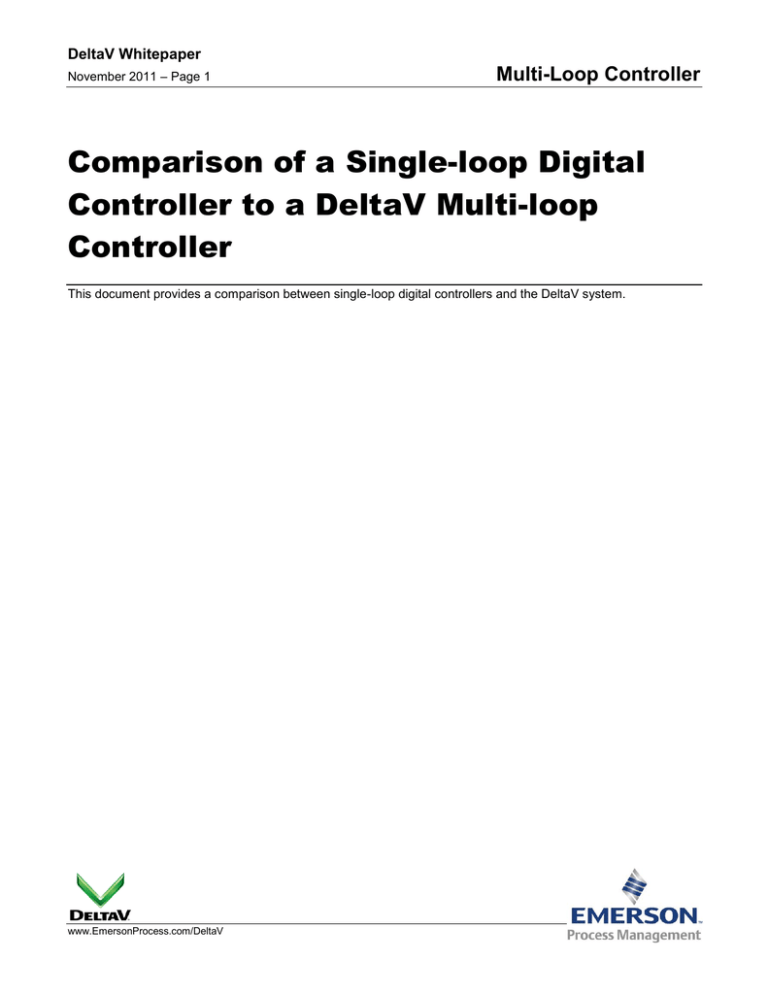
DeltaV Whitepaper
November 2011 – Page 1
Multi-Loop Controller
Comparison of a Single-loop Digital
Controller to a DeltaV Multi-loop
Controller
This document provides a comparison between single-loop digital controllers and the DeltaV system.
www.EmersonProcess.com/DeltaV
DeltaV Whitepaper
November 2011 – Page 2
Multi-Loop Controller
Table of Contents
INTRODUCTION ........................................................................................................................................................3
CONTRASTING SINGLE/DUAL-LOOP CONTROLLERS WITH THE DELTAV SYSTEM ......................................3
Control Capability ................................................................................................................. 3
Dual-loop Controllers Provide no Redundancy .................................................................... 3
Single/dual-loop controllers lack event and history recording. ............................................ 3
Today’s single-loop controllers do not interface with smart field devices............................ 4
The DeltaV system is easier to configure and diagnose. .................................................... 4
THE HUMAN MACHINE INTERFACE ON SINGLE/DUAL-LOOP CONTROLLERS ..............................................4
INFORMATION INTEGRATION CAPABILITY ..........................................................................................................5
DeltaV Whitepaper
November 2011 – Page 3
Multi-Loop Controller
Introduction
Plant expansion and upgrade projects frequently use subsystems that include not only the basic equipment, but
that include “standard” controls associated with this equipment. Boilers are a good example where the vendor’s
choice of peripheral equipment is often used without question. However, a number of questions should be asked
about the new equipment’s controls, especially when funding and capability are being reviewed. Sometimes the
equipment supplier quotes controls they find acceptable to the buyer, but more often they provide their “standard”
brand of systems. These “standard” controls may include single-loop controllers. This paper is based on one such
experience where a well-known boiler manufacturer proposed single-loop controllers for use with three boilers in a
grass-roots powerhouse.
From a perspective standpoint, it is perhaps worth noting that when any vendor bids on a project, they often offer
the minimum system to improve their chances of winning the project. It is not necessarily what they would use in
different circumstances, but it will meet minimum requirements. Considering the total installed cost of the boiler, it
is certainly desirable to contain costs, but cutting corners with the controls is unlikely to save much on capital and
will add hidden costs down the road during operation.
In discussions with several people knowledgeable about the boiler supplier, including one of their customers, it
seems that this supplier often proposes a well known brand of single-loop controllers (SLC) through a third party,
an engineering company. The new boiler’s standard control system usually includes four SLCs, a panel board,
chart recorder, and annunciator. The estimated price is $30K per boiler for these systems. In considering the
extensive additional capabilities of a multi-loop controller like the DeltaV ™ controller, the difference in cost is
probably not significant between the two and, with redundancy; the DeltaV controller might even be less
expensive. If the purchaser added in the cost for additional capabilities already provided by the DeltaV system,
cost would no longer be an issue.
Contrasting Single/Dual-loop Controllers with the DeltaV System
Control Capability
Most of today's single- or dual-loop microprocessor based controllers are very capable from a computational
viewpoint. Considering the experience of Nebraska and their engineering subcontractors, these controllers will
likely do a good job for continuous control of the boiler. At a minimum, these controllers need to have capabilities
for not only PID, but also some capability for calculations, velocity limiting, and lead/lag.
One question to consider is have they included logic that handles failures or abnormal events? For example, the
DeltaV system checks the validity of inputs on every scan. If a bad input is detected on a loop, that loop is placed
in manual mode. Likewise, the mode of certain loops used for cross-limiting air and fuel are continually monitored
and mistakes by the operator are overridden. It is unlikely that the dual loop controller has the memory or
resources for all this checking and protection for the operators. All this additional checking lowers the customer
cost or consequences in failures. It results in graceful degradation for failures of inputs and avoids operator
mistakes that can upset the plant at crucial times.
Dual-loop Controllers Provide no Redundancy
Single/dual-loop controllers lack event and history recording.
The DeltaV system includes an event chronicle to record changes in operation, failures, and system events. This
history is critical to determining what caused boiler trips, outages, or failures. With single- or dual-loop controllers,
there is typically no way to see if events were caused by problems with equipment, controls, or operator errors.
DeltaV Whitepaper
November 2011 – Page 4
Multi-Loop Controller
Most single-loop boiler control systems must include chart recorders for a few key continuous measurements that
are used for environmental records. Their secondary use is for diagnosing problems. However, these are so
limited that they often do not tell much about what happened and when. Charts also consume expensive paper
unless they are of the modern microprocessor type, and if they need to be repaired, it would be preferable to
replace them. For comparison, the DeltaV system comes with a real historical trend collection system that records
not only typical measurements, but calculated values as well. The number of variables that can be collected and
stored is enormous with the DeltaV system. These data are saved in a Microsoft Access™ database and can be
exported to Microsoft Excel or Word for reports.
Today’s single-loop controllers do not interface with smart field devices.
No single-loop controllers are known today that interface with smart devices using either HART or fieldbus
communications. Because the DeltaV system incorporates this technology, the cost for startup, maintenance, and
engineering is reduced to a minimum. For example, if fieldbus instrumentation were to be used, wiring costs could
be reduced 80 to 90% on new installations. With digital valve controllers, the positioner can be used to verify that
actual valve positions match those being requested or an alert is issued to indicate mismatches. Considering that
the majority of control problems are related to field devices, the potential for longer-term better control and
reduced maintenance cost can be realized. Requiring that the control system be capable of interfacing to smart
field devices will save new projects cost and reduce longer-term maintenance.
The DeltaV system is easier to configure and diagnose.
Many of the single- or dual-loop controllers have unique configuration languages. These often include table
structures with instruction codes and operands that are difficult to understand and maintain. Many integrators
have a lot of experience with these, but its unlikely that someone with the right skills and knowledge is going to be
quickly available after startup is over. Make sure that if single-loop controls are used, they come with a high-level
programming language that is easy to understand and modify. If a high level editor is used, then it should be
compliant with international standards.
The DeltaV system, on the other hand, comes with a high level, programming interface that works in the
Microsoft Windows environment. The basic blocks were designed with conformance with Foundation fieldbus
standards. The language is graphical and can be audited on-line in real time.
Diagnostics is another defining issue. With the DeltaV system, the diagnostics can tell you not only about the
device performance and loading but also about its hardware and software revision levels.
The Human Machine Interface on Single/Dual-loop Controllers
Obviously, the interface on single or dual loops is minimal. One of the problems people fail to note is that on dualloop controllers, you can see only one loop, or trend, or alarm at a time. This is not much help in a plant upset.
That is why it is usually necessary to include an alarm annunciation panel or other special monitoring system.
When things are upset, the operator needs access to outputs and inputs quickly and without making mistakes. If
fuel and air are in the same controller this is going to be difficult. Even if they are in separate controllers, it is going
to be awkward.
Ever try entering numbers on the small systems when you're in a hurry? It's too easy to make a mistake that can
cost a lot.
If you have seen the interface on the DeltaV system, it’s clear that much more information is available. Also,
changes can be made more quickly and accurately with drag-and-drop.
DeltaV Whitepaper
November 2011 – Page 5
Multi-Loop Controller
Information Integration Capability
Some of the single-/dual-loop systems have add-on communications capabilities with other systems and plant
information systems, but this really depends on the vendor. However, the customer needs to ask what kinds of
devices are required to make the connection and the effort to make the communications? These are often
unique, and have limited ability to transfer key information.
The DeltaV system was designed for use with plant information systems. For example, the integration stations are
designed for interfacing with plant networks while workstations are directly compatible with Microsoft Excel.
Overall, customers should take a close look at small systems that are unique, have lots of wiring required, and are
not compatible with today’s standards. If the total cost is looked at, the DeltaV system is going to be the lowest
cost system by far.
To locate a sales office near you, visit our website at:
www.EmersonProcess.com/DeltaV
Or call us at:
Asia Pacific: 65.777.8211
Europe, Middle East: 41.41.768.6111
North America, Latin America:
+1 800.833.8314 or
+1 512.832.3774
For large power, water, and wastewater applications
contact Power and Water Solutions at:
www.EmersonProcess-powerwater.com
Or call us at:
Asia Pacific: 65.777.8211
Europe, Middle East, Africa: 48.22.630.2443
North America, Latin America: +1 412.963.4000
© Emerson Process Management 2009. All rights reserved. For Emerson Process Management trademarks and service marks, go to:
http://www.emersonprocess.com/home/news/resources/marks.pdf.
The contents of this publication are presented for informational purposes only, and while every effort has been made to ensure their accuracy, they are not to be
construed as warrantees or guarantees, express or implied, regarding the products or services described herein or their use or applicability. All sales are governed
by our terms and conditions, which are available on request. We reserve the right to modify or improve the design or specification of such products at any time
without notice.
www.EmersonProcess.com/DeltaV

